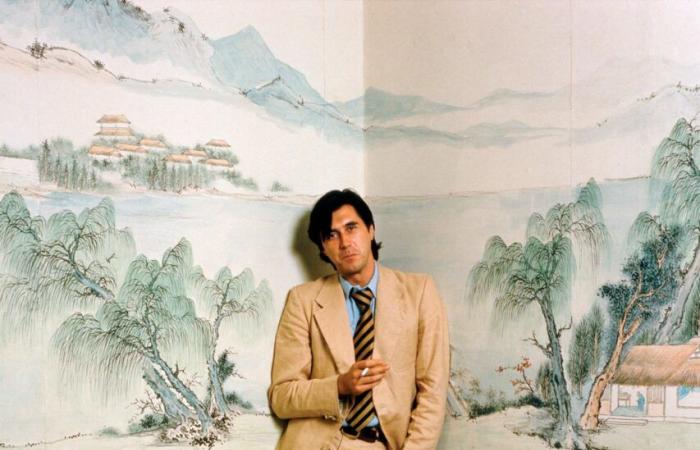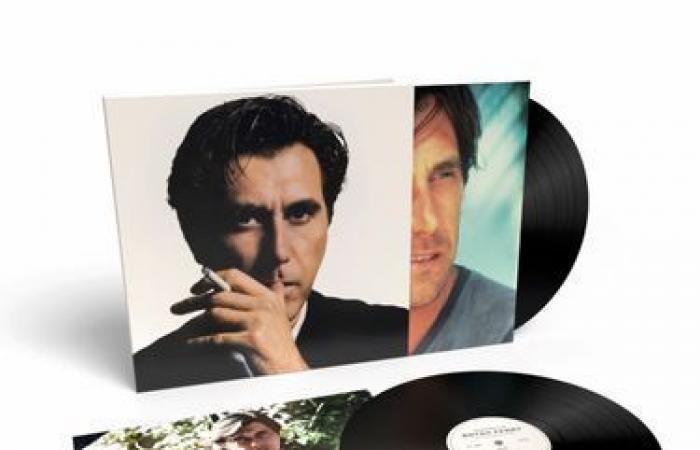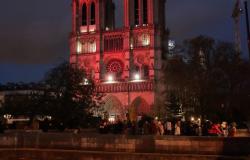Paris Match. This box set revisits your solo career. Why did you choose, for your first album, in 1973, to record only covers?
Bryan Ferry. I found recording Roxy Music's second album, 'For Your Pleasure', quite exciting. We had gained confidence, we knew how to run a studio. So I wanted to continue this momentum. But I didn't have any songs! It also seemed important to me to embark on a project far removed from what I was doing with Roxy, whose music was rather dark. I had in mind something more fun, which would appeal to the general public.
You cover songs by the Stones and the Beatles, Motown classics…
Yes, to move towards different genres. I also sing 'These Foolish Things', a 1930s standard which gave its name to the record and which has become one of my classics. I loved – still love – the songs from that era. I also wanted to cover Dylan, transform his guitar-vocal tracks into something very rock. I've never gotten tired of Dylan since… My version of 'A Hard Rain's a-Gonna Fall' launched my solo career.
Why did it take until 1977 and the album 'In Your Mind' for you to record your first solo album of original songs?
The rest after this ad
I don't really remember what pushed me towards this. What mattered above all for my solo records was being able to meet other musicians. I quickly realized that I would not be satisfied with just being the singer of Roxy Music. I loved this band, but I also wanted something else on the side. And I have to admit that I really liked working. I still like it, in fact, I even believe that it's 'my reason for being'.
On the next album, 'The Bride Stripped Bare', you reveal yourself a little. Isn't it your most intimate record?
Maybe… I had lived in the United States for a while, and that was reflected in this album. What I remember from it is also its title, a tribute to Marcel Duchamp, who put his whole life at the service of his work. Understanding this young, when I was in art school, was something very important in my career. It was nice to be surrounded by artists, talking about art, smoking cigars and looking cool… It made me want to do the same. [Il rit.]
How do you explain in retrospect that you chose music?
I discovered music before art. I was immersed in traditional American repertoire with The Platters, who sang 'Smoke Gets in Your Eyes'. Then I saw all the great jazz players who roamed Europe. But the most memorable concert for me was that of Otis Redding in London, where I hitchhiked to. He had extraordinary musicians, who danced and jumped in the air without being ridiculous. It was crazy. My musical background comes from there, it attracted me almost physically.
Is it a source of pride to have been one of the first to mix contemporary art and pop music?
One of the first, I don't know… But, yes, it has always seemed important to me to make music and art act together, through album covers in particular. But it still comes from jazz: all the great records on the Blue Note label had remarkable visuals. For me, rock albums needed just as much attention.
“I quickly understood that I would not be satisfied with just being the singer of Roxy Music”
By reuniting with Roxy Music in 1979, you will finally experience massive success.
I missed the camaraderie, and had been disappointed with the way 'The Bride Stripped Bare' had been received. Certainly, there was no strong single on this album, but I was convinced that I had written my most beautiful ballads on it. So, yes, Roxy found itself, and we made a trilogy of records which took us to the biggest venues, in the United States and in Europe.
Your biggest hit, ahead of 'Avalon', is your cover of 'Jealous Guy', by John Lennon, which you recorded after his death. Isn't that a bit ironic?
I am very happy about it! I really liked John Lennon and I was never a hit writer. It was truly the most elegant way to pay tribute to him. I also believe that this recovery has, modestly, allowed the public to experience their grief. It was a form of therapy for everyone…
The 1980s will be for you the decade where you impose your dandy, sexy and suave character…
[Il rit.] It’s a decade where, musically, I’m trying to develop. Take Picasso, he tried lots of different things, but, ultimately, it remains Picasso. For my part, I unconsciously wanted to evolve towards other universes.
Roxy Music in 1972, with, notably, Bryan Ferry (center) and Brian Eno (right).
Getty Images
/
© Brian Cooke / Redferns
For 'Bête noire', in 1987, you recruited Johnny Marr, who was then the guitarist for the Smiths. Have you always been on the lookout for young talent?
No way ! But I love the energy of new employees, especially when they are much younger than me. I also know that people of my generation can sometimes become complacent, no longer having the energy necessary for a project. That's why I always needed to work with different people. The worst thing is being surrounded by people who agree with everything you say. This is what leads to making mistakes… You have to know how to listen to criticism.
Why are you then taking a long break?
I wasn't really sure of myself anymore, I was looking for something, but without knowing what. In fact, I wanted to make the best album. So I waited until I was completely satisfied. And the sound engineer at the studio where we worked accidentally deleted the two songs we had just finished. We were just starting to work with computers. I really liked these songs, so I spent months redoing them. I locked myself in a tunnel by myself, from which I came out with a record, 'Horoscope'. But my label didn't like it, and I went back to my work. I wanted to try to understand all the possibilities that machines offered me. I was looking for the perfect color for my songs. And then I had a family. My life at that time was… complicated.
Have you often neglected yours?
Yes. I spent a lot, a lot of time on my songs. Sometimes wonderful things came out of it. Sometimes, less…
In 1999, you returned to success by covering American jazz standards. Why this shift?
It was a way of coming full circle with jazz, the music of my childhood. I really loved immersing myself in that world, playing live with all these musicians was wonderful.
“Is it really reasonable to go on tour at 80? »
You subsequently found your comrades from Roxy Music, but without ever making an album again. Was the magic no longer there?
It didn't really excite me. We tried, nonetheless. We spent a few days in the studio in the early 2000s, but it wasn't going anywhere, so we didn't push ourselves. And it's not a regret. [Il sourit.] I preferred my freedom.
A word about your last two albums, 'Olympia' and 'Avonmore'?
I'm happy with it, especially 'Olympia'. But these records pushed me on the road. I feel like I've spent three years doing the same show. It took Covid for all this to stop. And I haven't been back on stage since… apart from a few anniversary concerts with Roxy in 2022. I don't know if I'll ever go back. Traveling is becoming more and more tiring. Is it really reasonable to go on tour at 80?
Do you have any songs waiting in your drawers?
An album will be released in March, produced in collaboration with Amelia Barratt. A first title, 'Star', is also included in this retrospective box set. She is a young artist, who writes and paints in a brilliant way, very inspiring for me.
You sold 50% of your music rights to Iconic Artists Group, Irving Azoff's company. To better envision the future?
It seemed like the right thing to do, to be sure that, when I'm no longer here, my music will continue to live on. Deep down, we all hope that people will still listen to us when we are out of the box…
Bryan Ferry « Retrospective » (BMG)
© DR







